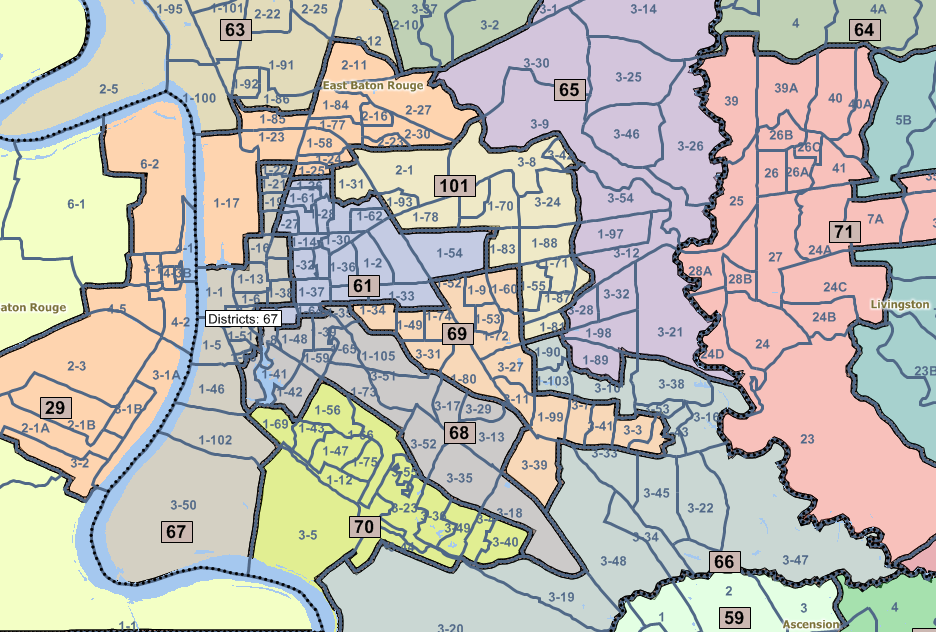320 Years of History
Gold Member
During a political election season, one of the central questions we all ask ourselves is whether we have any good reason to believe one, some or all of a candidate's words. While one can "go with one's gut," there is an objective and rational basis for concluding on the believability of any given candidate. Looking for congruence/consistency between what they, as individuals, (A) attest to thinking, feeling, and believing, that is, words, and (B) what they have done, are doing and aver to do going forward, aka deeds. Every candidate is able to "talk the talk." The question is whether they have and will continue to "walk the walk." A candidate's actions speak louder than any words they utter.
The most recent example I can think of is Donald Trump's words offered in an attempt to refute the claims that he's a racist and in an attempt to garner a larger share of African American's votes. So what exactly has he done that gives credence to a claim of his being a better President for black people than would Hillary Clinton? To answer that question, let's consider some of Trump's recent (2016) behaviors as go two horrible situations. Flint's water crisis and the Baton Rouge area's floods.
The people of Flint, MI, a city lived in predominantly by black folks, were without potable water because the entire water system was contaminated with lead.
What did Trump give to poor kids at an under-supplied NYC public school? Sneakers, yet every child there already had shoes; they didn't need shoes and nothing he donated was what they did need. Not books. Not pencils and paper. Not whiteboards. Not computers. Not vouchers for home high-speed Internet access. Not anything that would have in some notional (or material) way directly aided their efforts to learn.
So what does all that indicate?
Now here's the thing about Baton Rouge: it's among the most segregated cities in the South. So while the city, as a whole and based on the raw demographic figures, appears at a high level to be somewhat balanced in terms of its racial diversity, it's really not. Consequently, wherever one goes in Baton Rouge, one's most likely going to find that city subdivision overwhelmingly populated by folks of one race/ethnicity. The same can't be said of Flint, MI.
This is East Baton Rouge.
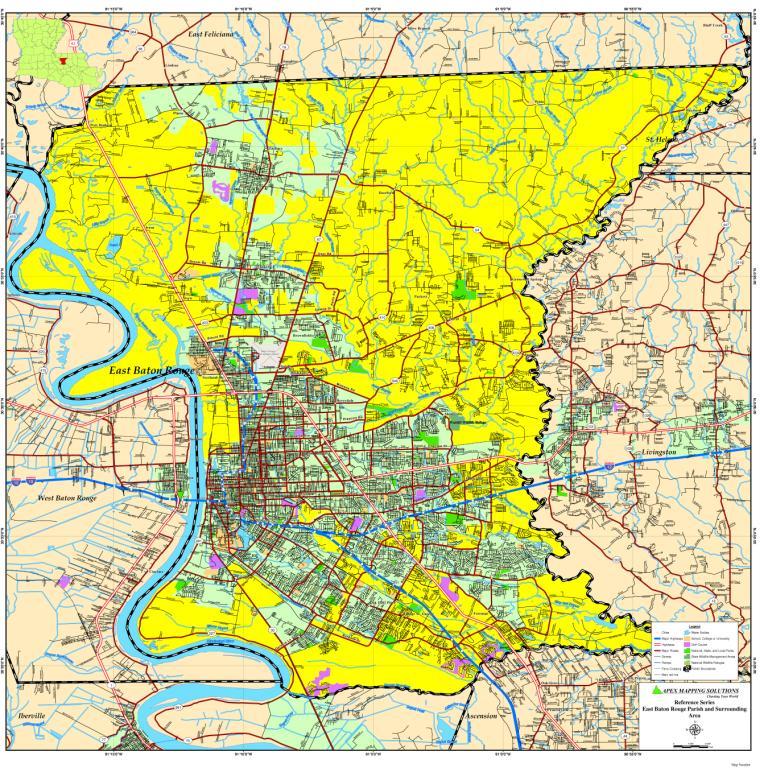
This is Baton Rouge Parish
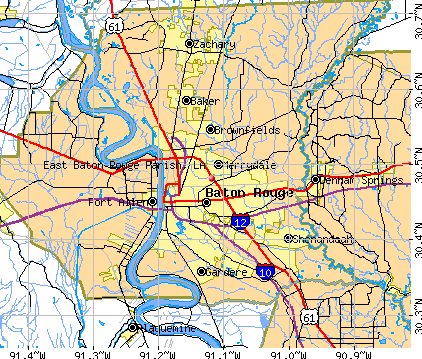
This is a map of the integration of Baton Rouge.

As one can see from the map above, basically, all of the eastern part of East Baton Rouge, which is where Trump went, is 80%+ white. Now I know too that the flooding is in East Baton Rouge, and that's meaningful in this case. But Trump didn't go to any part of Flint, MI, nor did he stop off in any other part of Baton Rouge, even though he had do pass through them to get to Greenwell Springs.
What're the situational differences between Flint and Baton Rouge and as go both candidates' behavior?
So, how do I interpret all that and apply it to my process of making a decision about the believability of Trump's words about his being "a good thing" for black folks? Well, I find his words very hard to believe in light of his actions. In comparison, I find Mrs. Clinton's words consistent with her actions, thereby making her words about her concern and empathy for black folks considerably more believable than are Trump's.
NOTE:
This thread is about using an individual's actions to gauge the credibility of their words. If you are of a mind to specifically discuss Trump or Clinton's, rather than someone else's, believability on a specific topic fine, but be sure to cite verifiable and fully objective instances of the individual's words and deeds along with your argument for or against the consistency between the person's words and deeds.
The most recent example I can think of is Donald Trump's words offered in an attempt to refute the claims that he's a racist and in an attempt to garner a larger share of African American's votes. So what exactly has he done that gives credence to a claim of his being a better President for black people than would Hillary Clinton? To answer that question, let's consider some of Trump's recent (2016) behaviors as go two horrible situations. Flint's water crisis and the Baton Rouge area's floods.
The people of Flint, MI, a city lived in predominantly by black folks, were without potable water because the entire water system was contaminated with lead.
- Did Donald Trump visit the city? No.
- Did Donald Trump send money or Trump Water to Flint? No
- Did Donald Trump even make a comment about Flint? No. In fact, what he said was, "I shouldn’t be commenting on Flint."
- Is Flint easily and directly accessed via his 757? Maybe. (One thing's certain; it's wasn't flooded.)

One thing's certain, it's a seven minute ride from the airport to the city center; however, all of Flint was affected by the water crisis, so going to the city center wasn't necessarily required. It's also relatively well integrated.
- Are the flooded areas of LA easily and directly accessed via his 757? Maybe. (I don't know how usable all the runways are there right now.) One thing that's certain is that from Baton Rouge's airport to where Trump went is a 22 minute ride.
- Did Donald Trump visit Louisiana due to the flood? Yes.
- What are the most severely affected parishes? (figures rounded)
- East Baton Rouge: 45% black; 49% white
Baton Rouge (city): 50% black; 40% white- Did he visit a part of the Baton Rouge area that has a meaningful quantity of black folks? No.
- Trump visited Greenwell Springs, LA in this parish. What are the demographics there? 89% white
- Did he visit a part of the Baton Rouge area that has a meaningful quantity of black folks? No.
- Ascension: 73% white; 22% black
- Livingston: 94% white
- St. Helena: 53% black; 45% white
- Tangipahoa: 70% white; 28% black
- East Baton Rouge: 45% black; 49% white
- Do you see non-white folks in the photos of Trump handing out blankets and whatnot? Basically, no. I found one photo that has one black person in it. (I Googled "trump visits louisiana")
- Below are photos of Trump and Mrs. Clinton in Baton Rouge, LA and Flint, MI, respectively, during those cities' crises. Do yo have to look hard to find black or white folks in Hillary's photo? What about Trump's?
Hillary in Flint
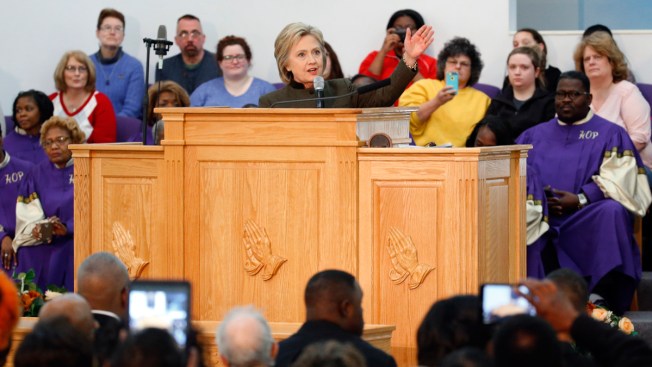
Trump in Greenwell Springs

There is video that shows one black guy where Trump is. Here's a still from that video.
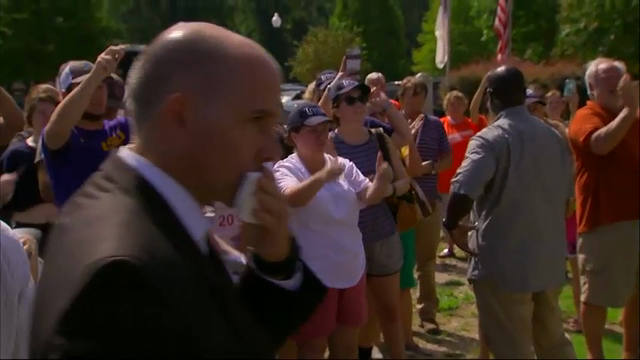
If you watch the video, you'll find out that the black guy is a member of Trump's Secret Service detail.
What did Trump give to poor kids at an under-supplied NYC public school? Sneakers, yet every child there already had shoes; they didn't need shoes and nothing he donated was what they did need. Not books. Not pencils and paper. Not whiteboards. Not computers. Not vouchers for home high-speed Internet access. Not anything that would have in some notional (or material) way directly aided their efforts to learn.
So what does all that indicate?
- It shows that Trump went out of his way to go to what is among the lily whitest part of Baton Rouge parish -- a parish that is overall ~50/50 white/black -- to appear and distribute tangible and practical forms of aid along with emotional support.
- It shows that just days after appealing to blacks and criticizing Democrats' integrity with regard to helping poor black folks, Trump's words in his speech were nothing more than words.
- It shows that Trump is just talk when it comes to giving a tinker's damn about black folks.
- It suggests Trump has little interest in providing to black folks the things black folks need, but with white folks in need, it crosses his mind to be practical and genuinely helpful.
Now here's the thing about Baton Rouge: it's among the most segregated cities in the South. So while the city, as a whole and based on the raw demographic figures, appears at a high level to be somewhat balanced in terms of its racial diversity, it's really not. Consequently, wherever one goes in Baton Rouge, one's most likely going to find that city subdivision overwhelmingly populated by folks of one race/ethnicity. The same can't be said of Flint, MI.
This is East Baton Rouge.

This is Baton Rouge Parish

This is a map of the integration of Baton Rouge.

As one can see from the map above, basically, all of the eastern part of East Baton Rouge, which is where Trump went, is 80%+ white. Now I know too that the flooding is in East Baton Rouge, and that's meaningful in this case. But Trump didn't go to any part of Flint, MI, nor did he stop off in any other part of Baton Rouge, even though he had do pass through them to get to Greenwell Springs.
What're the situational differences between Flint and Baton Rouge and as go both candidates' behavior?
- It was winter when Flint's crisis hit its zenith.
- "Water, water everywhere and not a drop to drink" applies to both situations.
- Michigan and Flint "lean Democrat." Louisiana is solidly Republican.
- Flint is relatively diverse and integrated; East Baton Rouge isn't integrated in any meaningful way, but "on paper" it may seem relatively well integrated.
- Trump visited and made donations to help one city and refused to even remark upon the other one's situation. Hillary Clinton raised money for both cities and visited one. (I'm not going to get into how much money they both aimed to contribute/raise. Trump loaned to his campaign more than five times what Hillary and Bill Clinton together earned in all of 2015.)
So, how do I interpret all that and apply it to my process of making a decision about the believability of Trump's words about his being "a good thing" for black folks? Well, I find his words very hard to believe in light of his actions. In comparison, I find Mrs. Clinton's words consistent with her actions, thereby making her words about her concern and empathy for black folks considerably more believable than are Trump's.
NOTE:
This thread is about using an individual's actions to gauge the credibility of their words. If you are of a mind to specifically discuss Trump or Clinton's, rather than someone else's, believability on a specific topic fine, but be sure to cite verifiable and fully objective instances of the individual's words and deeds along with your argument for or against the consistency between the person's words and deeds.
Last edited:

